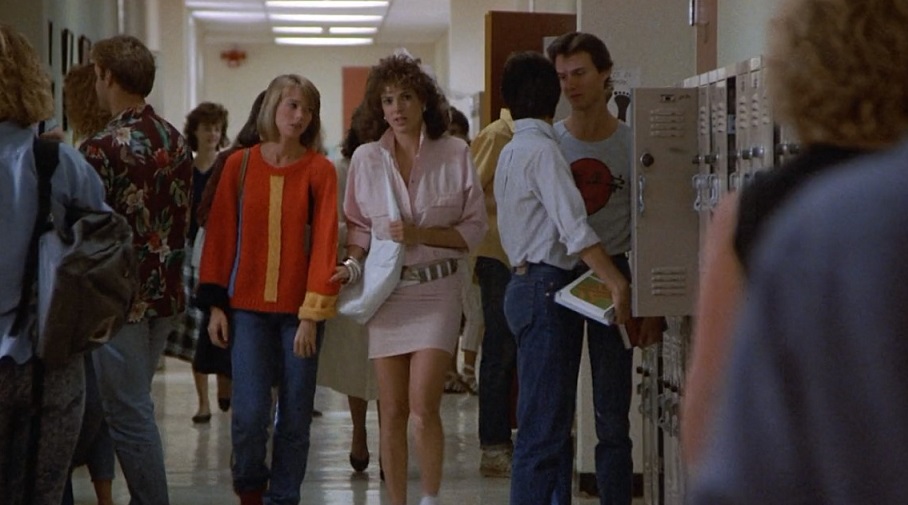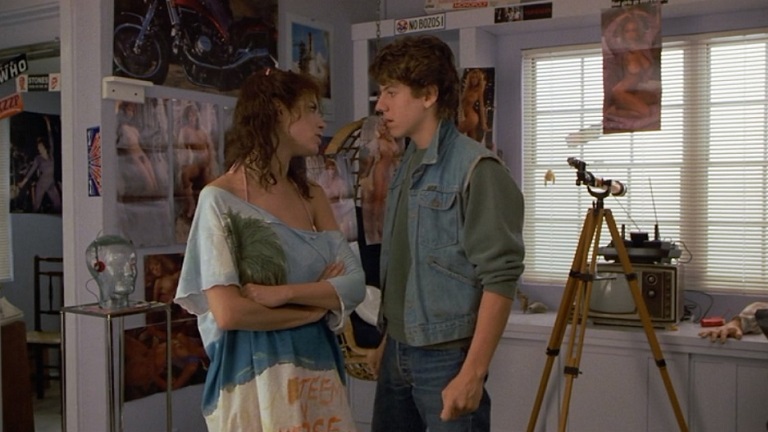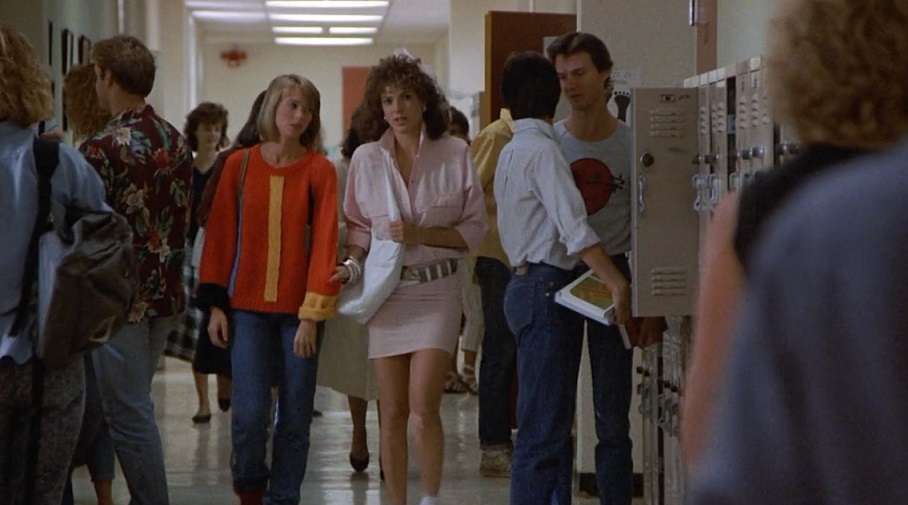The opening scene of Lisa Gottlieb’s 1985 comedy Just One of the Guys employs the male gaze in such an obvious, crass way, Laura Mulvey would’ve thrown her bucket of popcorn at the screen. In a tantalizingly slow pan, we inch up the negligee-clad body of a sleeping Joyce Hyser, as the squelchy 80s synth-pop song begins (recalling Vanity 6’s “Nasty Girl” but is in, reality, “Girls Got Something Boys Ain’t Got” by Midnight Star) We see a coltish, frisky Hyster leap out of bed, the camera in love with her lithe body. In the next scene, we see her at the breakfast table with her onscreen brother, who’s paging through a Playboy before school. At this point, it’s understandable if viewers write off Just One of the Guys as a simple teen sex comedy of the 80s. But that would be a mistake because if given a chance, the film is a sneakily clever story of sexism, queerness, and friendship, packaged as a mainstream comedy.
Just One of the Guys is a story about a young woman’s frustrations with sexism, patriarchy, and the objectification of beautiful women. It’s a smart, often-poignant film, in which a teenager learns that the world doesn’t necessarily operate as a meritocracy all the time. She also must learn – in a particularly bruising way – that teenaged girls will be underestimated and underrated, and men will often reduce them to sexual objects (including men of authority like her teachers). Watching Just One of the Guys in the current political and social climate gives the film new meanings and layers, unintended when the film was released during the neon-sluiced Reagan era. The movie works because the script – written by Dennis Feldman and Full House scribe Jeff Franklin – is willing to ask questions about double standards when it comes to women and girls as well as highlight just how performative gender roles are – this last point is especially explored in the film’s look at drag.
The plot – which not only adheres to some of the familiar tropes of teen sex comedies of the 1980s (more on that in a bit) but subverts them – contains elements of Shakespeare’s Twelfth Night as well as Shaw’s Pygmalion. Terri Griffith (Hyser) is a gorgeous high school senior who’s hoping to score an internship at a local newspaper. The script shows Terri as smart, capable, funny, but also popular – a queen bee of sorts. Despite being more interested in journalism than the high school prom, Terri isn’t the teen comedy nerd, nor is she the beautiful nerd, rendered hideous by a pair of glasses. In fact, when she first appears – dressed – she’s done up in trendy (for the times) clothes, with a main of moussed and sprayed hair. The message is though Terri is brainy, she’s also interested in being attractive, too – and the two aren’t mutually exclusive. When she doesn’t get the internship (and it goes to two male students), Terri is understandably upset. While rifling through the other entries, she overhears the journalism teacher, Mr Raymaker (Kenneth Tigar) chatting with another male teacher. Though she’s in Raymaker’s office, she clearly can hear the other teacher gush grossly about Terri’s physical assets – and even more concerning is that Raymaker doesn’t castigate or scold his colleague, but instead laughs in bro-ish comradery (reminiscent of the Trump Access Hollywood “locker room talk” recording). When Terri confronts Raymaker about the snub (she doesn’t even address the gross sexualisation), he insists that his decision was fair and that she may not be journalism material. Terri is convinced his motive is sexist and he doesn’t help his case when he suggests that she fall back on “modelling,” instead.

It’s here that the film takes an interesting and pivotal turn because Terri realises that even paternal figures like Raymaker – who, before this exchange, is presented as a good-natured authority figure – cannot be trusted. And so Terri turns to the only consistent male figure in her life: her younger brother Buddy (Billy Jacoby). A quick word on Buddy: superficially, he operates as the quintessential 80s hornball. He’s never not thinking about sex and he’s always ogling women who walk by him. When we see him in his bedroom, he’s pulling out a prodigious collection of Playboys from a treasure chest, covering his walls with the centrefolds.
When Terri goes to him for support and sees the wide array of breasts wallpapering Buddy’s room, she’s aghast. “Your room is why my life is totally screwed up,” she says. “You guys think that beautiful women are nothing but decoration, total airheads.” She then grouses, “It’s as if women’s lib never happened.”

What’s interesting about this exchange is that it highlights both the film’s virtues and vices. While it’s important that Terri rails against the objectification of women – we’re also reminded again of her beauty. In fact, her looks are very important to the plot and she cannot seem to move from one scene to another without either a character commenting on her good looks, or the camera lingering on her body (she looks positively Phoebe Cates-esque in a swimming pool scene) Yes, Terri can be objectively classed as beautiful and yes society does have a difficult time in reconciling sexual attractiveness with beauty, but Terri seems to ignore that her beauty is also the source of much of her privilege (not to mention her cis-ness, whiteness, and social class – the film doesn’t engage with any of these questions in the film) It takes Buddy, the personification of the adolescent male libido – to get through to her by mock-praising with a snide, “And yet somehow you find the courage to go on living, you’ve got guts” when she brings up her beauty again. This line – however facetious the delivery – is important because it’s the only time that Terri’s privilege is really called on; given that this is a 80s teen sex comedy, the diegesis of the film presents a high school that is defined by a hierarchy that is decided by physical attractiveness. Terri is beautiful and is dating a handsome college freshman named Kevin, so she’s near the top of the caste system (we see supposedly “plainer” peripheral characters who make up the rest of the student body, and they often neatly are slotted into high school fiction tropes like “nerd” or “geek”)
And even if the film doesn’t explore beauty privilege, it does like at male privilege (I’d say white male privilege, but unfortunately, whiteness is presented as the default in this film and so race isn’t discussed) Terri looks to drag to “pass” so that she can succeed in a “man’s world.” Her plan is to dress as a boy and enrol in another school as a male student and submit her article as a man. Here again the script does something very clever as it exposes masculinity and maleness as merely performative – an act that can be “taught” as opposed to certain immutable characteristics tied to biological sex. Terri looks at the outward, superficial markers of “male” and adopts them so that she can operate in her field without the baggage of her gender; the lessons she’s given by Buddy are akin to a drag mother teaching her daughter the art of drag; Terri turns to Buddy, whose representation of maleness is drag – it’s exaggerated, campy, and entertaining – to school her on how to successfully ape the markers of masculinity. Like a drag queen who wears false breasts, Terri stuffs her pants with a sock to simulate a man’s crotch (momentarily jealous, Buddy muses, “I should try that”) Buddy also shows her how to walk and in a weird moment, throws some tired jive talk, as well.

The film’s conflict – or series of conflicts – begin when Terri – now Terry – goes to her new school with her new identity and sees that her male peers have complicated lives, as well. Because she’s new to the school, she’s no longer on the higher rung of the social ladder, and is therefore, forced to start from scratch, and befriends Rick (Clayton Rohner), whom she looks at as her Eliza Doolittle. Somewhat of an outcast, she draws him out of his shelf, makes him over, and in the process – predictably – falls in love with him. She also has to contend with her dying relationship with her boyfriend, as well as dealing with a bully, Greg Tolan (Karate Kid villain William Zabka) Terri’s life becomes quite messy as a result of the loss of her “cool status” and is therefore learning – and gaining empathy – for the less popular students in her school. The conflict comes to a disastrous head at prom when Terri’s lies start to fall apart. Kevin shows up unexpectedly, and Terri finally admits her feelings and the truth to Rick, who, feeling betrayed rejects her.

Films that offer their heroes happy endings often do so to pander to the audience’s feelings of solidarity and affection. In Just One of the Guys, we’re given a series of happy endings – but they all feel earned and organic. Terri decides to write an article “I Was a Teenaged Boy” and earns a spot in the internship; she also earns the respect – and heartfelt apology – from Raymaker, and she, in the tradition of romantic comedy, she gets the guy: Rick eventually appears in front of Terri’s newspaper office, and the two reconcile.
Films that offer their heroes happy endings often do so to pander to the audience’s feelings of solidarity and affection. In Just One of the Guys, we’re given a series of happy endings – but they all feel earned and organic. Terri decides to write an article “I Was a Teenaged Boy” and earns a spot in the internship; she also earns the respect – and heartfelt apology – from Raymaker, and she, in the tradition of romantic comedy, she gets the guy: Rick eventually appears in front of Terri’s newspaper office, and the two reconcile.
Obviously, a better movie would’ve addressed institutional sexism in a more direct way at the end of the film – or at least hinted at the kind of sexism and bias that awaits Terri once she graduates college and becomes a professional journalist. But Just One of the Guys isn’t that kind of film. For all its estimable qualities, it’s still hampered by the limits of its genre. There are still moments of casual slut-shaming, misogyny, and homophobia that were seemingly baked into the characteristics of the genre.
But still, Gottlieb, Feldman, and Franklin manage to tell a story that resonates and feels timely and doesn’t date all that much (except for the fashion and soundtrack) The #MeToo movement has placed a harsher spotlight on sexism, sexual harassment, and gender-based bias. Second-wave feminism has declared “the personal is political” and that is how gender politics operate in Gottlieb’s film. Terri is linking her personal experience of bias and sexism to larger questions of gender discrimination. There is a glimmer of hope that Terri’s work may have brought about some structural change in the way Raymaker apologizes and understands that he underestimated her work and value as a journalist. Though Terri doesn’t seem too preoccupied with easing the road for young girls after her, the film suggests that she may have by being able to prove her teacher wrong. Though the film ends on a frothy high note, with a silly site gag of Buddy straddling a motorbike with a hardened older woman, the real moral of the film, that gender is complicated and fraught with tension, but should impede one’s goals of success, shines through.

Reblogged this on An American in London.
LikeLike